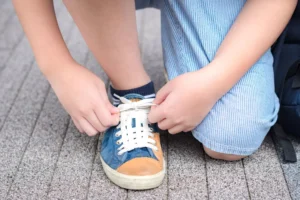
Those Clumsy Middle-school Years
Middle schoolers can be clumsy. Here is a way to help your child through those awkward growth spurts.

Friendships and self-identity will have a profound impact on adolescents and may need guidance from parents.
Navigating the complexities of peer influence during adolescence can be a challenging experience for both teens and their parents. As teenagers seek to establish their identities and find their place in the world, they are often significantly influenced by their friends and social circles.
The impact of peer influence on adolescents cannot be underestimated. The right people crossing their path at critical times can reinforce positive values and enhance the entire process of growing up. The wrong individuals can escort them into extremely negative detours or suck the life out of them. As parents, we can guide our children in navigating these relationships and fostering a healthy environment for them to grow and flourish.
Whoever walks with the wise becomes wise, but the companion of fools will suffer harm. Proverbs 13:20
Your job is to pray with utter abandon for the friends your adolescent will make over the next several years. Without being too pushy about it, make every effort to make friends with your teenager’s friends. If your home is the most teen friendly in the neighborhood, chances are the troops will gather under your roof or in your backyard and respond to your influence in the process.
Because peer influence can play such a serious role for good or ill in your teen’s life, you will need to be forthright and directive about where and with whom their time is spent — especially in the early years. If the drama club, Scouts, or athletic teams provide a consistently healthy niche, by all means encourage them. But if a new “friend” who manifests an abundance of toxic language and behavior enters your adolescent’s life, don’t hesitate to take some defensive measures. This may include insisting that they spend time together only under your roof with an adult on the premises (and no closed bedroom doors).
If your church has a strong and active youth group, do everything you can to support it and your teen’s involvement in it. But if your youth group has gone stale or has become a clique zone, find another one. The program should honor your family’s faith and values, of course, but should also accept all comers, build positive identities, and be fun as it promotes spiritual growth.
In addition to participating in youth groups, encourage your teenager to get involved in service projects and volunteer work. These activities provide opportunities for them to engage with like-minded individuals, develop a sense of purpose, and foster empathy and compassion. By serving others, they learn about the importance of giving back to the community, strengthening their moral compass and worldview.
To help your child develop a well-rounded identity, encourage them to explore their interests and engage in extracurricular activities or hobbies. Whether it’s sports, music, art, or academic clubs, these activities provide opportunities for self-discovery, growth, and the development of lifelong skills.
Whether they are National Merit Scholars or total nonconformists (or both), adolescents are fervently searching for a clear sense of identity. Whatever the guise or getup, the questions they continually ask boil down to these: Who cares about me? and What can I do that has any significance? These questions are at the heart of understanding their peer’s influence.
If the answers are “my God, my family and my close friends” and “impact the world in a positive way,” your main task — and it usually will be a pleasant one — will be serving as cheerleader and sounding board as your son or daughter finds the best track on which to run.
If the answers are “my friends (and hardly anyone else)” and “have fun (and hardly anything else),” the ultimate outcome could be more unpredictable. Most adolescents with this mind-set eventually grow up and find a productive niche, while some stay in this shallow, meandering rut well into adulthood. Some also drift into drug use or sexual activity in their search for the next diversion — and ultimately pay dearly for it.
For the teenager whose answers are “no one” and “nothing,” if different answers are nowhere on the horizon, the consequences may be more serious: depression, acting out, even suicidal behavior.
It is important that your child enters adolescence with some clear and positive answers to the questions of caring and significance. During the coming seasons, they will probably ask them often and in many different ways — some of which may catch you way off guard. Even if your teen has lost their bearings or abandoned common sense, you will still need to communicate that your love and their significance are unshakable.
As in earlier years of childhood, you will need to enforce limits and help them make some course corrections until they are on their own. But they must always know that your fundamental love for them will never change, regardless of grades, clothes, a messy room, dented fenders, or more serious issues.
Creating an open and honest line of communication with your teenager is essential. Encourage them to share their thoughts, feelings, and experiences with you, and listen without judgment. By fostering a supportive environment, you can help them navigate the challenges of adolescence and guide them in making informed decisions about their relationships and peer influence.
The power of peer influence on adolescents is immense, and it’s crucial for parents to take an active role in guiding their children through these formative years.
In doing so, you create an environment where positive peer influence can flourish and where you can actively observe and guide their interactions. By fostering positive friendships, creating a welcoming home environment, supporting their involvement in youth groups and extracurricular activities, and maintaining open communication, you can help your teen develop a strong sense of identity and significance. Through your love and support, they will be better equipped to navigate the challenges of adolescence and emerge as well-rounded, confident adults.
Adapted from the Complete Guide to Baby & Child Care, a Focus on the Family book published by Tyndale House Publishers, Inc. © 1999,2023 Focus on the Family. All rights reserved. International copyright secured. Used by permission.





Dr. Daniel Huerta is Vice President of Parenting and Youth for Focus on the Family, overseeing the ministry’s initiatives that equip moms and dads with biblical principles and counsel for raising healthy, resilient children rooted in a thriving faith.
He is a psychologist, a licensed clinical social worker, and the author of 7 Traits of Effective Parenting. For many years, he has provided families with practical, biblically-based and research-based parenting advice on topics including media discernment, discipline, communication, mental health issues, conflict resolution, and healthy sexuality in the home. He is passionate about coming alongside parents as they raise contributors, instead of consumers, in a culture desperately in need of God’s kingdom.
Dr. Huerta has been interviewed by various media outlets including Fox News, Fatherly, Christianity Today, WORLD Magazine, and CBN, and he is a frequent guest on Christian radio stations across the nation. He’s also written for publications, including The Washington Post, on various topics related to marriage and parenting. He participated in the development of Focus on the Family’s Launch Into the Teen Years, a resource to help parents prepare their kids for adolescence, and he speaks regularly at retreats, conventions, and online events.
Dr. Huerta has maintained a private practice in Colorado Springs, Colorado since 2003 and has served families through Focus on the Family since 2004. He and his wife, Heather, have been married since 1997 and love being parents to their three teen children, Alex, Lexi, and Maci.

Middle schoolers can be clumsy. Here is a way to help your child through those awkward growth spurts.

Do your teens have unrealistic expectations of what they deserve? If so, you may be training them to feel entitled. Break habit parenting habit of giving them privileges without responsibility.

Taking responsibility for your children’s education can be the most rewarding decision you will make as a parent.